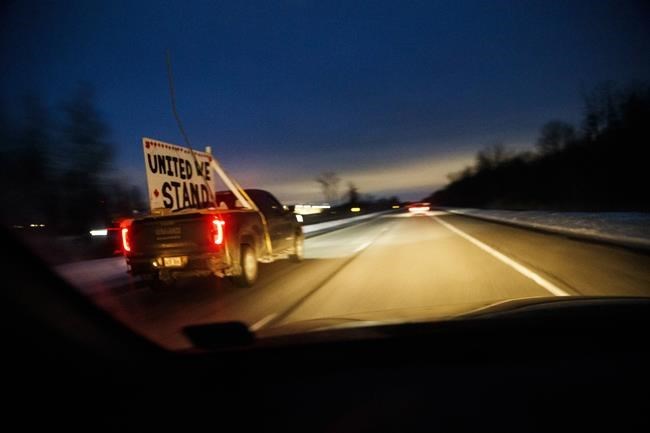OTTAWA — Patrick King is in court for a bail hearing Tuesday where a woman who acknowledges she only met him four weeks ago is offering a surety of half the value of her Alberta home to guarantee his bail.
King, who has been known to promote racist conspiracy theories online, appeared at a bail hearing on Tuesday. Only a handful of people were in an Ottawa courtroom for the proceedings while many others watched virtually.
In the prisoner’s box, King wore a grey hoodie emblazoned with the word Odin and had to be reminded by the judge to keep a mask on during the hearing due to COVID-19 restrictions.
At one point King's lawyer tersely directed him to be quiet, saying it was not his time to give evidence.
Alberta resident Kerry Komix is proposing to be a surety for King should he be granted bail. Under the plan, King would live at her home in a spare room.
Komix said she would ensure King followed any bail conditions and attended future court dates, or she would risk forfeiting a $50,000 bond.
"As soon as he’s released he will be in my 24-hour care," she said.
Komix said she was a light sleeper and had an attentive dog.
"I don't see any way he can breach it without my knowledge," she said.
"I will be able to hear every move that he makes."
Under cross-examination by the Crown, Komix said she had known King for four weeks, having travelled to Ottawa herself as part of the trucker convoy.
That prompted further questioning about how well Komix really knows King, as well as about her own beliefs.
The Crown played a videos of King making derogatory statements about different races and appearing pleased that a court order had been required earlier this month to quell the honking of protest trucks.
Komix said the King she knows loves every race.
Just before a break in the proceedings, King was served with papers from the law firm of Paul Champ, which is spearheading a civil action against protest organizers on behalf of downtown Ottawa residents.
King, 44, was arrested on Friday and faces charges of mischief, counselling to commit mischief, counselling to commit the offence of disobeying a court order and counselling to obstruct police.
Meanwhile, Tamara Lich, one of the most visible organizers behind protests against COVID-19 restrictions and the Liberal government near Parliament Hill, has been denied bail.
An Ontario court judge denied Lich bail in Ottawa Tuesday morning, saying she believed there was a substantial likelihood she would reoffend if released.
Justice Julie Bourgeois said the convoy's effect on the community was immense and she felt Lich was obstinate and disingenuous in her responses to the court during her bail hearing on Saturday.
"I cannot be reassured that if I release you into the community that you will not reoffend," Bourgeois said.
"Your detention is necessary for the protection and safety of the public."
Lich appeared in court via a video link, rather than in person.
Lich was arrested last Thursday and charged with counselling to commit mischief. She promised during a bail hearing on Saturday to give up her advocacy of the protest and return to Alberta.
Bourgeois reserved her bail decision on Lich until Tuesday.
In addition to holding Lich in custody, Bourgeois ordered Lich to have no contact with King or other convoy organizers Benjamin Dichter, Christopher Barber and Daniel Bulford.
Barber was arrested the same day as Lich and released on bail on Saturday.
Lich's bail decision came the day after the House of Commons voted to support the government's use of measures under the Emergencies Act, which Prime Minister Justin Trudeau invoked last week in a bid to end blockades in Ottawa and at key Canada-U.S. border crossings.
The Liberal government gained the support of New Democrats to get the measures approved.
The Senate is scheduled to start its own debate today on the measures.
Ottawa police said in a statement Monday that officers have made 196 arrests, with 110 facing a variety of charges.
Police also said 115 vehicles connected to the protest have been towed.
This report by The Canadian Press was first published Feb. 22, 2022.
Mia Rabson and Jim Bronskill, The Canadian Press
